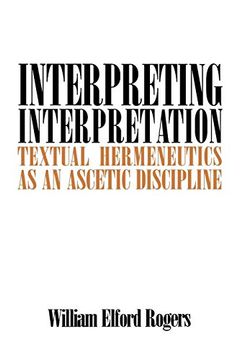Share
Interpreting Interpretation: Textual Hermeneutics as an Ascetic Discipline
William E. Rogers (Author)
·
Penn State University Press
· Paperback
Interpreting Interpretation: Textual Hermeneutics as an Ascetic Discipline - William E. Rogers
Choose the list to add your product or create one New List
✓ Product added successfully to the Wishlist.
Go to My Wishlists
Origin: U.S.A.
(Import costs included in the price)
It will be shipped from our warehouse between
Monday, June 17 and
Wednesday, July 03.
You will receive it anywhere in United Kingdom between 1 and 3 business days after shipment.
Synopsis "Interpreting Interpretation: Textual Hermeneutics as an Ascetic Discipline"
In Interpreting Interpretation, William E. Rogers searches for a model for literary education. This model should avoid both of two undesirable alternatives. First, it should not destroy any notion of discipline in the traditional sense, terminating in the stance of Rorty's "liberal ironist." Second, it should not regard literary education as an attempt to cause students to ingest a pre-determined mix of facts and cultural values, terminating in the stance of E. D. Hirsch's "cultural literate." From the semiotics of C. S. Peirce, Rogers develops the notion of interpretive system. The interpretive system called textual hermeneutics is used to interpret interpretation. From that perspective, the world looks like a text. Applying the principle rigorously allows an articulation of the problematic relations among interpretation, philosophy, and language itself. Interpreting Interpretation clarifies the conception of textual hermeneutics as an ascetic discipline by showing the consequences of this conception for interpreting canonical texts and for humanities education in general. Discussions of poetry by Robert Frost and by John Ashbery illustrate how this conception applies to an analysis of literary texts. Ultimately, the book offers a Peircean alternative to the educational theories implied in the pragmatism of John Dewey and of Richard Rorty. Rogers provides a new vocabulary for talking about what people are doing when they read, write, speak, and hear interpretive statements about texts. The new vocabulary acknowledges the great difficulty of "teaching texts" in the face of postmodern anxieties about pluralism, relativism, or nihilism. What emerges is not curriculum but method—an argument that the humanities teach not texts but interpretive systems.
- 0% (0)
- 0% (0)
- 0% (0)
- 0% (0)
- 0% (0)
All books in our catalog are Original.
The book is written in English.
The binding of this edition is Paperback.
✓ Producto agregado correctamente al carro, Ir a Pagar.

